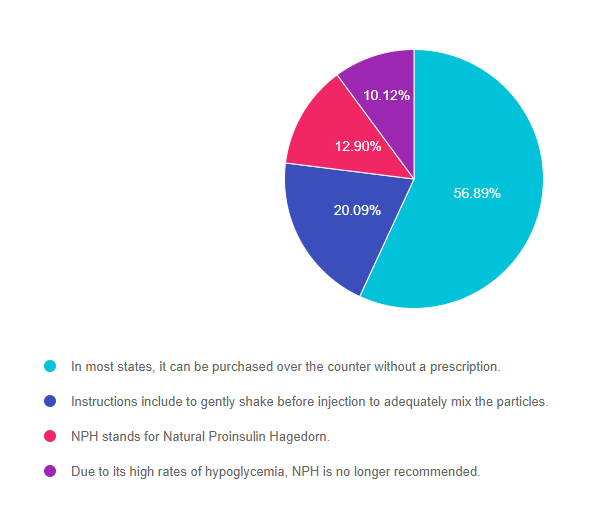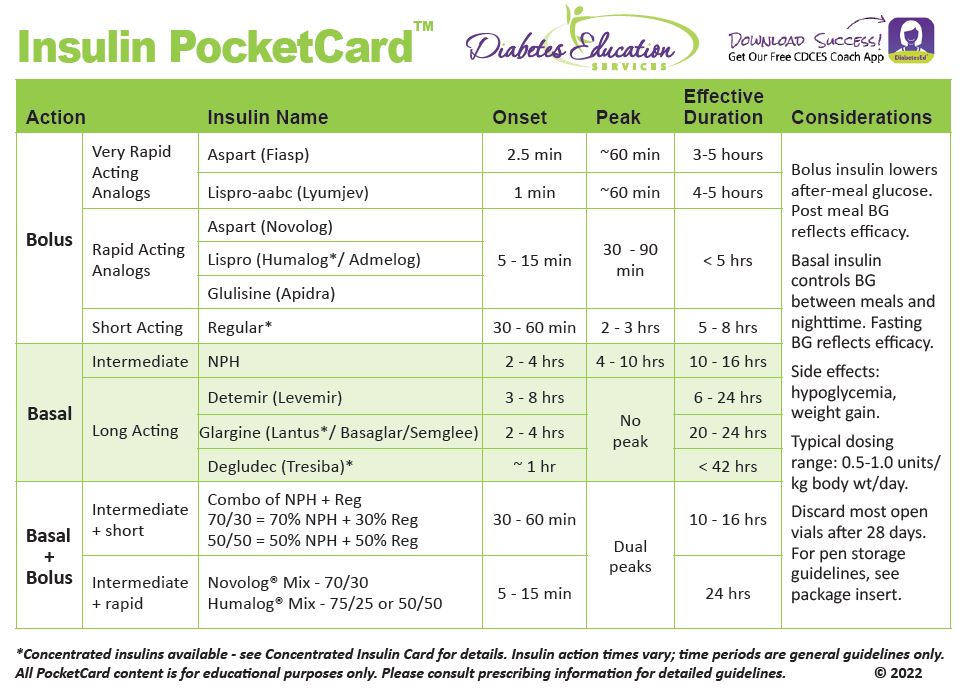
We quizzed test takers on NPH insulin. 57% of respondents, chose the best answer. We want to share this important info so you can pass it on to people living with diabetes and your colleagues, plus prepare for exam success!
Before we start though, if you don’t want any spoilers and haven’t tried the question yet, you can answer below: Answer Question
Question: NPH insulin, introduced in 1946 was one of the first basal insulins. It is considered intermediate-acting basal insulin since the duration of action is about a half-day. Given its effectiveness and affordability, it is on the World Health Organization’s List of Essential Medicines.
Which of the following is a true statement regarding NPH insulin?
Answer Choices:
- In most states, it can be purchased over the counter without a prescription
- Instructions include to gently shake before injection to adequately mix the particles
- NPH stands for Natural Proinsulin Hagedorn
- Due to its high rates of hypoglycemia, NPH is no longer recommended.

As shown above, the most common choice was option 1, the second most common answer was option 2, then option 3, and then finally option 4.
Getting to the Best Answer
Answer 1 is correct. 56.89% chose this answer, “In most states, it can be purchased over the counter without a prescription.” YES, GREAT JOB. Actually, there are three over-the-counter insulins that are available for purchase without a prescription. They include regular insulin, NPH (intermediate-acting), and 70/30 insulin, a premixed combination of NPH and regular.
People might be interested in purchasing these older insulins because of their lower cost. Walmart sells all three types under the ReliOn brand umbrella for roughly $25 a vial. Chain pharmacies can also sell regular, NPH, and 70-30 insulin. However, OTC insulin is more frequently sold at Walmart than other chain pharmacies, likely due to the considerably lower price point.
– For more info on the different types of insulins, download our FREE PocketCards.
– For Info on affordable insulin, please visit our Insulin Cost Savings Resource page.
Answer 2 is incorrect. 20.09% of you chose this answer, “Instructions include to gently shake before injection to adequately mix the particles.” Shaking NPH insulin can cause clumping and is not recommended. According to the package insert, the most accurate instruction is to gently roll NPH insulin or invert it repeatedly until the particles are evenly distributed. NPH looks milky and homogeneous when properly mixed.
Answer 3 is incorrect. 12.90% of respondents chose this answer, “NPH stands for Natural Proinsulin Hagedorn.” So close. The name refers to N for neutral, P for protamine (a protein), and H for its creator scientist name Hans Christian Hagedorn. NPH insulin is FDA-approved in the adult and pediatric population to manage type 1 and type 2 diabetes. It is also useful in gestational diabetes. More info.
Finally, Answer 4 is incorrect. 10.12% chose this answer, “Due to its high rates of hypoglycemia, NPH is no longer recommended.” NPH insulin does have a somewhat higher risk of hypoglycemia. One way to decrease the risk of hypoglycemia and high day-to-day variability is to thoroughly re-suspend NPH until it is uniformly cloudy before injecting. This will improve the pharmacodynamic and pharmacokinetic profile of NPH insulin, leading to less hypoglycemia. NPH insulin onset of action is 2 to 4 hours, time to peak effect is 4 to 10 hours, and total duration 10-16 hours. The newer basal insulins don’t have a peak, so there is slightly less hypoglycemia. However, with careful dosing and education, NPH insulin can provide a lower cost and effective alternative to the newer analog insulins, especially for those living with type 2 diabetes.
We hope you appreciate this week’s rationale! Thank you so much for taking the time to answer our Question of the Week and participate in this important learning activity!
Want to learn more? Join our Webinar on Hyperglycemic Crisis, which is ready for viewing!
Want to learn more about this topic?
Enroll in our Diabetes Fundamentals | Level 1
Airs Live Jan 11th – Jan 27th, 2022 at 11:30 am PST
This bundle is specifically designed for healthcare professionals who want to learn more about diabetes fundamentals for their clinical practice or for those who are studying for the Certified Diabetes Care and Education Specialist (CDCES) exam.
2022 Live Webinar Updates
- January 11, 2022 – Class 1 – Getting to the Nitty Gritty 1.5 CEs
- January 13, 2022 – Class 2 – Nutrition and Exercise 1.5 CEs
- January 18, 2022 – Class 3 – Insulin Therapy & Pattern Management 1.5 CEs
- January 20, 2022 – Class 4 – Meds Overview for Type 2 – 1.5 CEs
- January 25, 2022 – Class 5 – Goals of Care – 1.5 CEs
- January 27, 2022 – Class 6 – Hypoglycemia, Sick Days, Monitoring, Foot Care 1.5 CEs
Intended Audience: A great course for healthcare professionals in the field of diabetes education looking for a straightforward explanation of identification and treatment of hyperglycemic crises.
Instructor: Beverly Thomassian RN, MPH, CDCES, BC-ADM is a working educator and a nationally recognized diabetes expert.
All hours earned count toward your CDCES Accreditation Information
Sign up for Diabetes Blog Bytes – we post one daily Blog Byte from Monday to Friday. And of course, Tuesday is our Question of the Week. It’s Informative and FREE! Sign up below!
[yikes-mailchimp form=”1″]The use of DES products does not guarantee the successful passage of the CDCES exam. CBDCE does not endorse any preparatory or review materials for the CDCES exam, except for those published by CBDCE.










